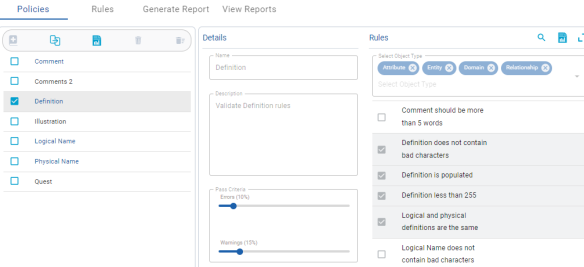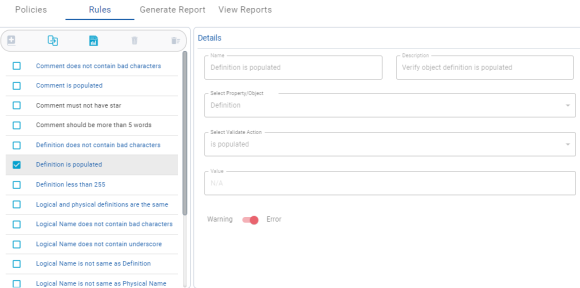A new module, Enterprise Modeling Compliance has been added in erwin Mart Portal. Enterprise Modeling Compliance (EMC) provides you (non-admin user) with a mechanism to apply metadata standards across your mart catalogs and maintain data model quality at the enterprise level.
To use EMC, you need to be well-versed with business requirements so that you can create and use a combination of policies and rules on your data models. This enables you to implement high compliance standards in your modeling practice.
Rules define a set of protocols to be followed in an organization for model compliance. You can create rules or use default rules to be followed throughout the model and populates errors or warnings if not followed.
Now, these rules are applied to the default polices or user-defined polices, which you can create. Policies are globally defined set of principles. Using policies, you can maintain business standards across your organization. Polices are applied to the objects such as attributes, columns, entities, tables, domains, and relationships, which are available in the models.
Based on the policy applied to the model, job can be executed and generate comprehensive reports with pass, error, and warning statistics. If the job result got failed, you can go to the model and improve the data quality for the objects to pass the job result.
The following sections walk you through these features:
Polices
Policies are globally defined set of principles. Using policies, you can maintain business standards across your organization. It includes the rules applied to objects, passing criteria with errors and warnings. For example, the below policy, Definition, a default policy, includes rules applied to attribute, domain, entity, and relationship. Here, pass criteria is 10% error and 15% warning.

Rules
Rules define a set of protocols to be followed in an organization. You can create rules for default and user defined polices. It includes validation action with the value to validate. For example, the below rule, Definition is populated, is applied to definition. This means, If definitions available in models do not populate, the errors are generated.

Reports
When you run the job, policy is applied to the catalog and based on applied policies and rules, comprehensive reports are generated with pass, error, and warning statistics. For example, the below report, Comments for GBQ, has passed with 59% having 41% errors, 0% warnings. You can see catalog name is Google BigQuery, object type is entity/table and rules applied to the catalog are, Comment does not contain bad characters and Comment is populated.

To create polices, rules, and reports, refer Using Enterprise Modeling Compliance topic.
|
Copyright © 2025 Quest Software, Inc. |